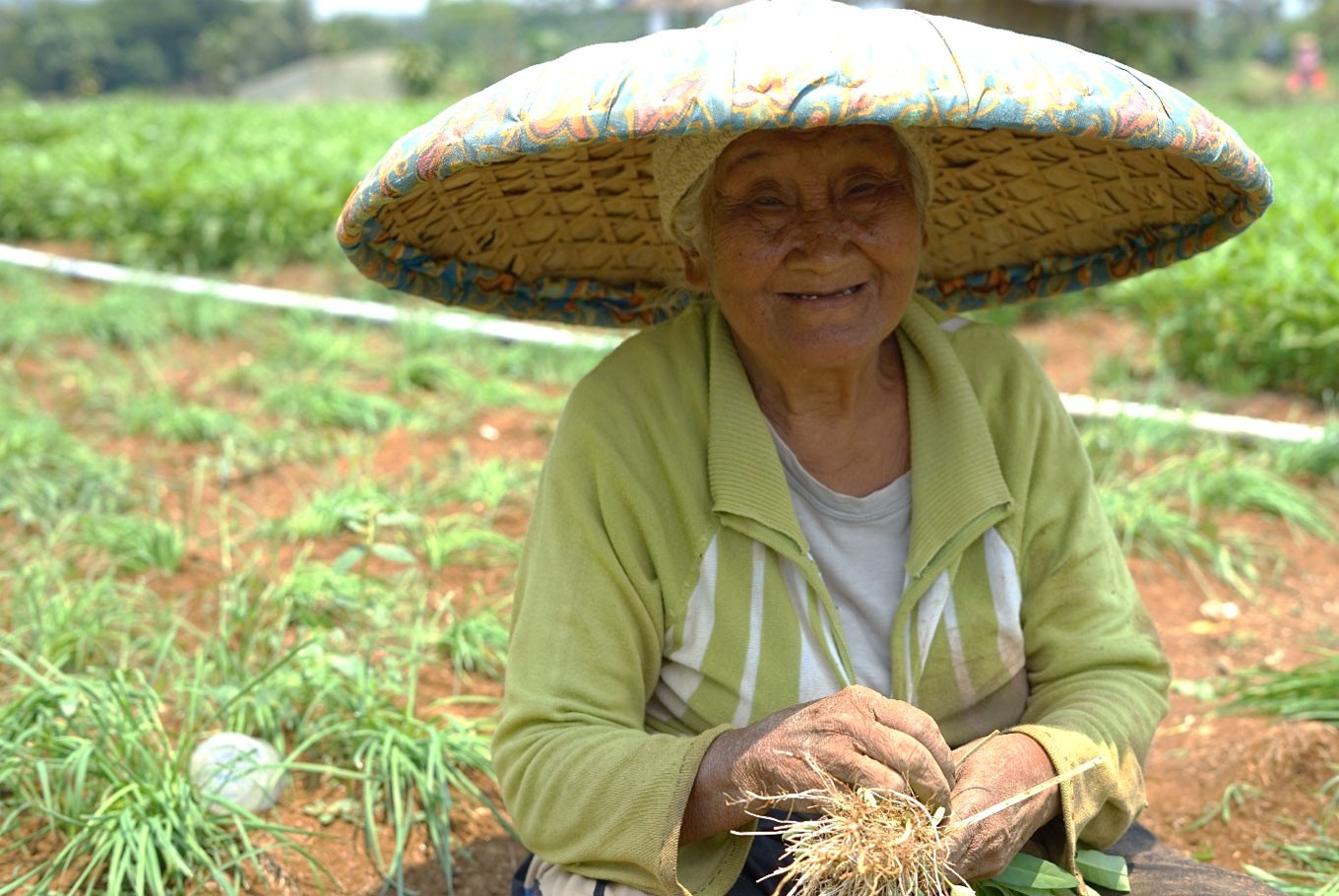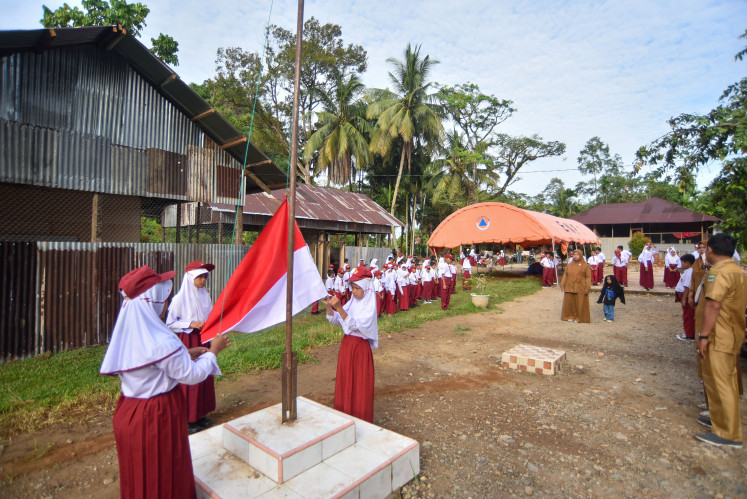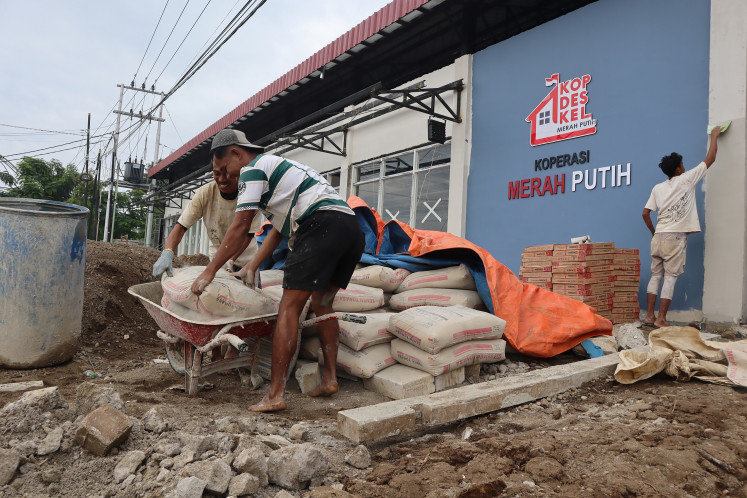Popular Reads
Top Results
Can't find what you're looking for?
View all search resultsPopular Reads
Top Results
Can't find what you're looking for?
View all search resultsFemale farmers face multi-layered struggle
This problem of “invisible” female farmers is common across Southeast Asia, but Indonesian female farmers are relatively more disadvantaged than their counterparts in Thailand and Philippines, as these are predominantly matrilineal societies.
Change text size
Gift Premium Articles
to Anyone
M
any Indonesian children grow up listening to this Islamic proverb, “Heaven is at the bottom of your mother’s feet.”
Yet, Indonesian female farmers continue to struggle in many ways. Around 40 percent of family smallholder farmers are women, amounting to 7.4 million in 2013, and contribute to almost all the stages of production. However, they lack access to land, credit and extension services.
In 2003, only one-third of land title certificates in Java was owned by women. Although the 1974 Marriage Law provides for the ownership interests of the wife, this is rarely translated into print on the certificates. This is partly because of a lack of education and patriarchal mindset to have a man’s name on the certificate.
This unequal access to land means unequal access to credit, since land certificates are needed for collateral. This has real implications on the lives of female farmers and their families. In Cianjur, West Java, female farmers and their families suffer heavy debts to middlemen due to limited access to credit. The debts are taken to purchase not just agricultural inputs, but also basic necessities or emergency healthcare. Many of these women become pressured to become migrant workers in Taiwan or Saudi Arabia to clear the debts.
Extension services tend to neglect female farmers. There is this assumption that agricultural work performed by women is seen as secondary to their domestic responsibilities or male involvement in agriculture. The truth is these women are so poor that they have no choice but to work on the farms, but suffer lack of recognition by authorities.
Women conspicuously lack access to leadership and decision-making, despite being significant players. Agricultural organizations are often dominated by males. Mixed farmer groups with both active female and male members are uncommon. Although there are a few female agricultural organisations in Yogyakarta and South Sumatra, they tend to be left out of decision-making in the community.
Female farmers are also expected to bear the double burdens of domestic and agricultural work. At times, they are unpaid or paid less than men. This exerts a significant physical and psychological toll on them.
These problems are all the more pressing because existing trends are exacerbating the situation of female farmers. Rural-urban migration of men has led to “feminization” of agriculture, meaning that in the men’s absence, the agricultural work is now passed on to women.
Yet these women lack the male privileges of access to resources and leadership. This may undermine the productivity of farms. Also, climate change and the consequent unpredictable, extreme weather is exerting significant pressure on women. As farmers, they have to adapt their farming schedule to the weather; as mothers and wives, they have to ensure the family’s welfare in such trying circumstances.
Empowerment of female farmers will reap tremendous benefits for all stakeholders. If women have greater access, their agricultural and domestic productivity will increase, translated into more substantial and stable family incomes.
It has been shown that increases in a woman’s income and assets can improve the welfare of her household more significantly than that of increases in men’s income. Importantly, this will also improve the dignity of female farmers in the community. Greater involvement of women in agricultural organizations will enable more informed decisions to be made, and enhance the production and profitability of the organizations.
Policymakers need to ensure that female farmers have access to the crucial resources and leadership opportunities. Concrete measures towards this include improving education of girls and the encouragement of women’s participation and leadership in agricultural organizations. Efforts must be taken to bolster women’s confidence. Moreover, female farmers need to be equipped with knowledge on adaptation methods, and climate forecasting technologies.
However, Indonesia is a hugely diverse country; different regions have different cultural norms. Javanese female farmers occupy an ambiguous position; they are often not reflected as owners of the land formally on paperwork, but informally, Javanese culture works fortuitously to protect them. The Javanese language has a word for marital property, gono-gini, and this concept is more influential in shaping behavior than official legislation or even Islamic ideas.
Furthermore, the traditional practice of arisan -– a small-scale rotating savings association – serves as an informal source of credit for Javanese female farmers. The Balinese and Minangkabau people have always had strong roles for women where women can own land in their own rights and actively farm their lands.
In contrast, the most vulnerable female farmers probably reside in the eastern parts of Indonesia. In Sulawesi, women often suffer the brunt of crop failures because they have to seek out additional income.
Likewise, in Southern Central Timor, women become malnourished during droughts because they are usually the last ones to eat in the family. In Papuan culture, women always have had low status and education despite extreme workloads. It is crucial for policymakers to take into account the different cultural backgrounds of female farmers from different regions, to best understand their unique situation and needs.
This problem of “invisible” female farmers is common across Southeast Asia, but Indonesian female farmers are relatively more disadvantaged than their counterparts in Thailand and Philippines, as these are predominantly matrilineal societies.
If we are to truly respect our mothers as providers, as a medium towards paradise and a better life, we first need to pave a smoother path for them. As the bedrock of our world, they definitely deserve better.
***
The writer is a Singaporean intern working with the ASEAN Farmers’ Organization Support Program at the ASEAN Foundation in Jakarta. She is in her final year of study in history at the University of Oxford.The author would like to thank Mardiah Basuni (Bina Desa foundation) and Stephanie Heng for their kind guidance and support.
---------------
We are looking for information, opinions, and in-depth analysis from experts or scholars in a variety of fields. We choose articles based on facts or opinions about general news, as well as quality analysis and commentary about Indonesia or international events. Send your piece to academia@jakpost.com.










